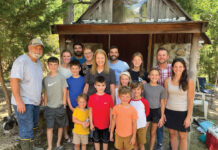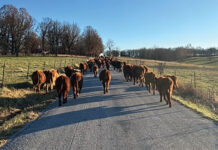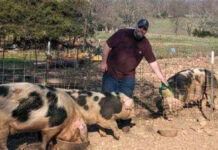
In today’s society, it’s becoming increasingly difficult to jump into farming and ranching without family ties to the business. Chris and Brittany Shouse from Dadeville, Mo., took a leap of faith and decided to follow their passion and become cattle producers, despite not being born into industry.
Their dream transpired in 2008 with the purchase of 10 commercial stock cows. In 2012, Chris decided to change the dynamics of the herd, sell all of the commercial cows, and replace them with five registered yearling Gelbvieh heifers. Their herd size has since grown to 22 head. To Chris, the quality of cattle was more important than quantity.
The Gelbvieh breed was the perfect fit for Chris and Brittany since they work full-time off the farm and have three young children. Chris commends the breed for its maternal traits, docility and ability to maintain condition on fescue grass.
The maternal traits are essential to the success of the growing seedstock operation. Chris retains the heifers to build his herd and will breed them around 750 to 800 pounds or 15 months, through natural service. He sells the bulls off the farm to commercial and seedstock producers.
“I want to raise good momma cows and I want to have decent weaning weights. I try to keep high milk production in a bull, because any heifers he produces, I want to be able to keep,” he explained.
Chris prefers his Gelbviehs to be homozygous black and polled. He has utilized timed AI and recently purchased a bull from a Seedstock Plus sale to maintain these traits and increase the genetic quality of his calves.
Chris sells the virgin bulls at 14 to 18 months of age through social media and word-of-mouth. He provides the buyers with genomic-enhanced EPDs from the American Gelbvieh Association and a semen test.
Another trait of the Gelbvieh breed Chris likes is their ability to maintain condition and gain on grass. Chris will lightly grain his bulls at weaning, but otherwise their diet consists of grass and hay.
“I try not to feed a lot of grain. I try to grow everything on fescue grass without pushing them hard. I want to see how they develop just on fescue grass. I want to see how they perform on the bare necessities,” Chris explained.
One challenge the couple is facing is the lack of available local land to rent or purchase. Since they started from scratch, they had to rent ground at first, but eventually were able to purchase 77 acres. They continue to rent an additional 40. With land being limited, Chris tries to make the most out of every head he sells.
“It’s hard to have cows without land and it’s hard to have land without cows,” Chris explained.
Another challenge the young couple faced was getting their land ready for cows with minimal equipment.
“I had to go in and bush hog and build fence. We started from nothing and gradually worked our way up. It’s a slow process, but we are getting there,” Chris said.
“We borrowed machinery from the neighbors. I bought a tractor, a 1963 Fordson Super Major. Just this year, I bought a newer tractor,” Chris said.
“It has been hard. We are improving things with time,” Brittany added.
Throughout their journey, Chris and Brittany have gained valuable knowledge and offer advice to other beginning producers.
“Be prepared to work really hard. It is sunup to sundown. Sometimes even past sun down and weekends. That’s just want it takes. It’s not fast. You have to be patient,” Chris said.
Chris credits much of his knowledge to Johnny Melton, who he considers to be a great friend and mentor. Whether they are working cows or improving the land, Melton’s simple piece of advice to him was to be patient.
“He has been there from day one,” Chris said.
“I just figure if I am going to do something, I am going to do it the best I can. I always try to do everything 110 percent. I don’t like doing stuff half way. If I am going to do it, I want to do it right,” he exclaimed.
One step at a time, Chris and Brittany are making their mark in the beef industry and are creating an agricultural heritage for their children, Daylyn (12), Camryn (10) and Maisy (7).







